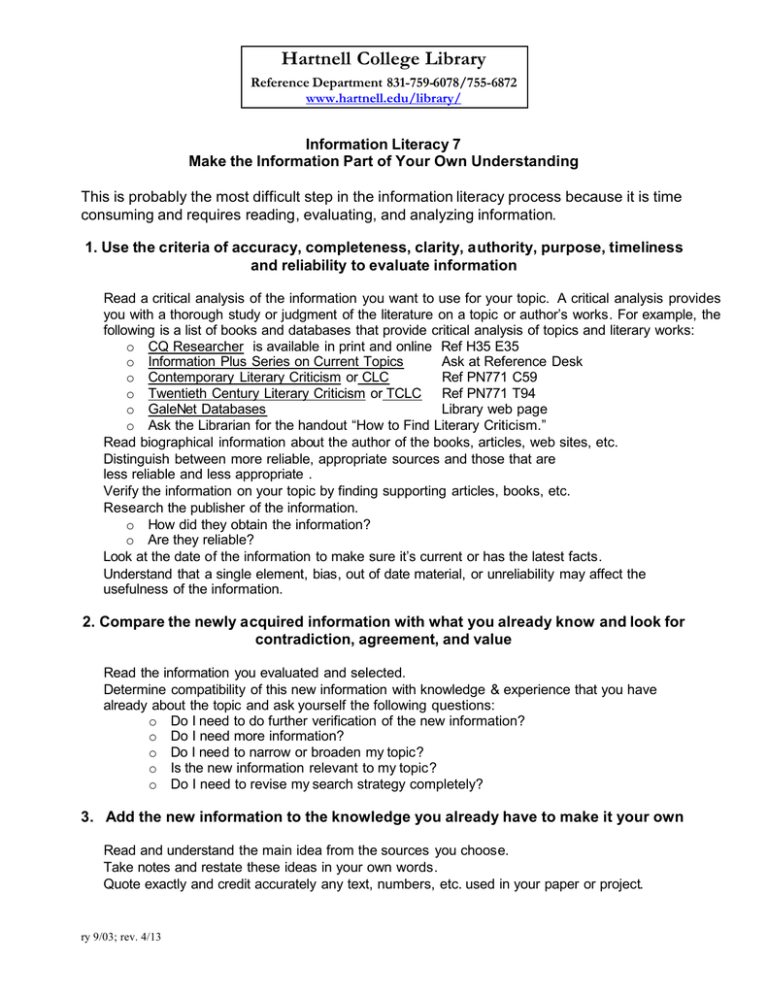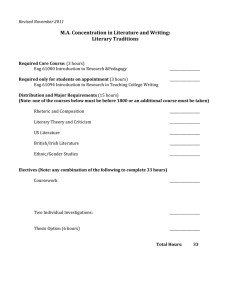Hartnell College Library
advertisement

Hartnell College Library Reference Department 831-759-6078/755-6872 www.hartnell.edu/library/ Information Literacy 7 Make the Information Part of Your Own Understanding This is probably the most difficult step in the information literacy process because it is time consuming and requires reading, evaluating, and analyzing information. 1. Use the criteria of accuracy, completeness, clarity, authority, purpose, timeliness and reliability to evaluate information Read a critical analysis of the information you want to use for your topic. A critical analysis provides you with a thorough study or judgment of the literature on a topic or author’s works. For example, the following is a list of books and databases that provide critical analysis of topics and literary works: o CQ Researcher is available in print and online Ref H35 E35 o Information Plus Series on Current Topics Ask at Reference Desk o Contemporary Literary Criticism or CLC Ref PN771 C59 o Twentieth Century Literary Criticism or TCLC Ref PN771 T94 o GaleNet Databases Library web page o Ask the Librarian for the handout “How to Find Literary Criticism.” Read biographical information about the author of the books, articles, web sites, etc. Distinguish between more reliable, appropriate sources and those that are less reliable and less appropriate . Verify the information on your topic by finding supporting articles, books, etc. Research the publisher of the information. o How did they obtain the information? o Are they reliable? Look at the date of the information to make sure it’s current or has the latest facts. Understand that a single element, bias, out of date material, or unreliability may affect the usefulness of the information. 2. Compare the newly acquired information with what you already know and look for contradiction, agreement, and value Read the information you evaluated and selected. Determine compatibility of this new information with knowledge & experience that you have already about the topic and ask yourself the following questions: o Do I need to do further verification of the new information? o Do I need more information? o Do I need to narrow or broaden my topic? o Is the new information relevant to my topic? o Do I need to revise my search strategy completely? 3. Add the new information to the knowledge you already have to make it your own Read and understand the main idea from the sources you choose. Take notes and restate these ideas in your own words. Quote exactly and credit accurately any text, numbers, etc. used in your paper or project. ry 9/03; rev. 4/13 Apply the same evaluation criteria of accuracy, completeness, etc. to the logic and content of the arguments in your readings. Bring information from various sources together and look for new ideas, perspectives, insights, and understanding and ask yourself the following: o How do my own experiences relate to this information? o Does this new information affect what I already know about this or any topic? 4. Expand your newly acquired knowledge Develop your own ideas from the information you have read. Support your ideas with material or proof from your reading and research. Test your new theories using the appropriate methods of research, experiment, etc. Ask yourself the following questions: o Is my topic interesting or important? o Can I prove my arguments or theories? o Are there additional questions that need to be answered? o Do I need to do further research on this topic? 5. Finalize your goal in looking for the information Your goal may be an assignment by an instructor or it may be personal research on buying a new car, a medical diagnosis, etc. Use the most appropriate method to communicate the information to others. o Written or oral report o Spreadsheet o Video o Web page o Combination of methods Hartnell College Courses That Develop This Aspect of Information Literacy ENG 1A ENG 1B ENG 2 LBT 90 CIS 90 College Composition and Reading College Reading and Composition Critical Thinking and Writing Internet Literacy Internet Literacy For Further Information on Information Literacy “Information Literacy Competency Standards for Higher Education: Standards, Performance Indicators and Outcomes.” Association of College & Research Libraries. American Library Association. 18 Jan. 2000. 10 Mar. 2013 www.ala.org/acrl/standards/informationliteracycompetency. “A+ Research and Writing.” Internet Public Library. School of Information University of Michigan. 8 June 2002. 10 Mar. 2013 www.ipl.org/div/aplus/. ry 9/03; rev. 4/13


